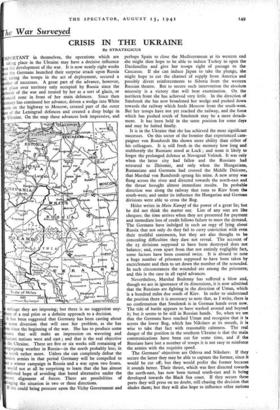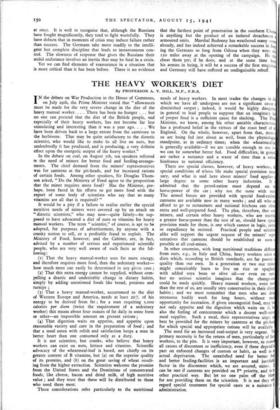he War Surveyed CRISIS IN THE UKRAINE
By STRATEGICUS
NiPORTANT in themselves, the operations which are taking place in the Ukraine may have a decisive influence on the development of the war. It is now nearly eight weeks e the Germans launched their surprise attack upon Russia d, taking the troops in the act of deployment, secured a tuber of successes. A great part of the advance, however, k place over territory only occupied by Russia since the ,break of the war and treated by her as a sort of glacis, or caned zone in front of her main defences. Since then rmany has continued her advance, driven a wedge into White ssia on the highway to Moscow, crossed part of the outer e of the Leningrad defences and created a deep bulge in Ukraine. On the map these advances look impressive, and mileage they are imposing; but there is no suggestion any- ere of a real prize or a definite approach to a decision.
It has been suggested that Germany has been casting about some diversion that will ease her problem, as she has ne since the beginning of the war. She has to produce some cess that will make an impression on wavering and luctant nations west and east ; and that is the real objective the Ukraine. There are five or six weeks still remaining of mpaigning weather in Russia—in the north probably less; in south rather more. Unless she can completely defeat the usstan armies in that period Germany will be compelled to ce a winter campaign in Russia and a war upon two fronts. Would not at all be surprising to learn that she has almost andoned hope of avoiding that hated alternative under the esent alignment of forces. There are possibilities of 'aging the situation in two or three directions.
If she could bring pressure upon the Vichy Government and perhaps Spain to close the Mediterranean at its western end she might then hope to be able to induce Turkey to open the Dardanelles and give her troops right of passage to the Caucasus. If she can induce Japan to take the plunge, she might hope to cut the channel of supply from America and possibly divert reinforcements to Siberia from the western Russian theatre. But to secure such intervention the absolute necessity is a victory that will bear examination. On the northern front she has achieved very little. In the direction of Smolensk she has now broadened her wedge and pushed down towards the railway which feeds Moscow from the south-west. But her troops have not yet reached the railway, and the force which has pushed south of Smolensk may be a mere detach- ment. It has been held in the same position for some days and may be halted finally.
It is in the Ukraine that she has achieved the most significant successes. On this sector of the frontier that experienced cam- paigner von Rundstedt has shown more ability than either of his colleagues. It is still fresh in the memory how long and stubbornly the Russians stood at Luck ; and none is likely to forget the prolonged defence at Novograd Volinsk. It was only when the latter city had fallen and the Russians had retreated to Zhitomir, and only when the Hungarians, Rumanians and Germans had crossed the Middle Dniester, that Marshal von Rundstedt sprang his mine. A new army was flung across the river and directed towards the north-east and the thrust brought almost immediate results. Its probable direction was along the railway that runs to Kiev from the south-west; and under its influence the Hungarian and German divisions were able to cross the Bug.
Hitler writes in Mein Kampf of the power of a great lie; but he did not think the matter out. Lies of any sort are like cheques; the time arrives when they are presented for payment and immediate loss of credit follows failure to meet the demand. The Germans have indulged in such an orgy of lying about Russia that not only do they fail to carry conviction with even their truthful statements, but they are also thought to be concealing difficulties they dare not reveal. The account of the 25 divisions supposed to have been destroyed does not balance; and, even apart from that not entirely negligible fact, some factors have been counted twice. It is absurd to note a huge number of prisoners supposed to have been taken by encirclement and then to set down the number of the wounded. In such circumstances the wounded are among the prisoners; and this is the case in all rapid advances.
Nevertheless, Marshal Budenny has suffered a blow and, though we are in ignorance of its dimensions, it is now admitted that the Russians are fighting in the direction of Uman, which is a hundred miles due south of Kiev. In order to understand the position there it is necessary to note that, as I write, there is no confirmation that Smolensk is in German hands even now. The tide of battle appears to have washed around and beyond it; but it seems to be still in Russian hands. So, when we see that the Germans have reached Uman and recognise that it is across the lower Bug, which has Nikolaev at its mouth, it is wise to take that fact with reasonable calmness. The real danger of the position in the southern Ukraine is that the main communications have been cut for some time, and if the Russians have lost a number of troops it is not easy to reinforce the armies with the requisite speed.
The Germans' objectives are Odessa and Nikolaev. If they secure the latter they may be able to capture the former, since it would be cut off; but they would prefer the former because it sounds better. Their thrust, which was first directed towards the north-east, has now been turned south-east and is being developed towards the Black Sea coast. If they secure these ports they will press on no doubt, still chasing the decision that eludes them; but they will also hope to influence other nations at once. It is well to recognise that, although the Russians have fought magnificently, they tend to fight wastefully. They have defects that in moments of crisis may induce failure rather than success. The Germans take more readily to the intelli- gent but complete discipline that leads to instantaneous con- trol. The slowness of response that gives the Russians their stolid endurance involves an inertia that may be fatal in a crisis.
Yet we can find elements of reassurance in a situation that is more critical than it has been before. There is no evidence that the farthest point of penetration in the southern Ukrairt is anything but the product of an isolated detachment armoured units. Marshal Budenny has weathered many already, and has indeed achieved a remarkable success in kee; ing the Germans so long from Odessa when they were orilt 120 miles away at the opening of the campaign. He cheat them yet; if he does, and at the same time ke his armies in being, it will be a success of the first magnitup and Germany will have suffered an undisguisable rebuff.



























 Previous page
Previous page